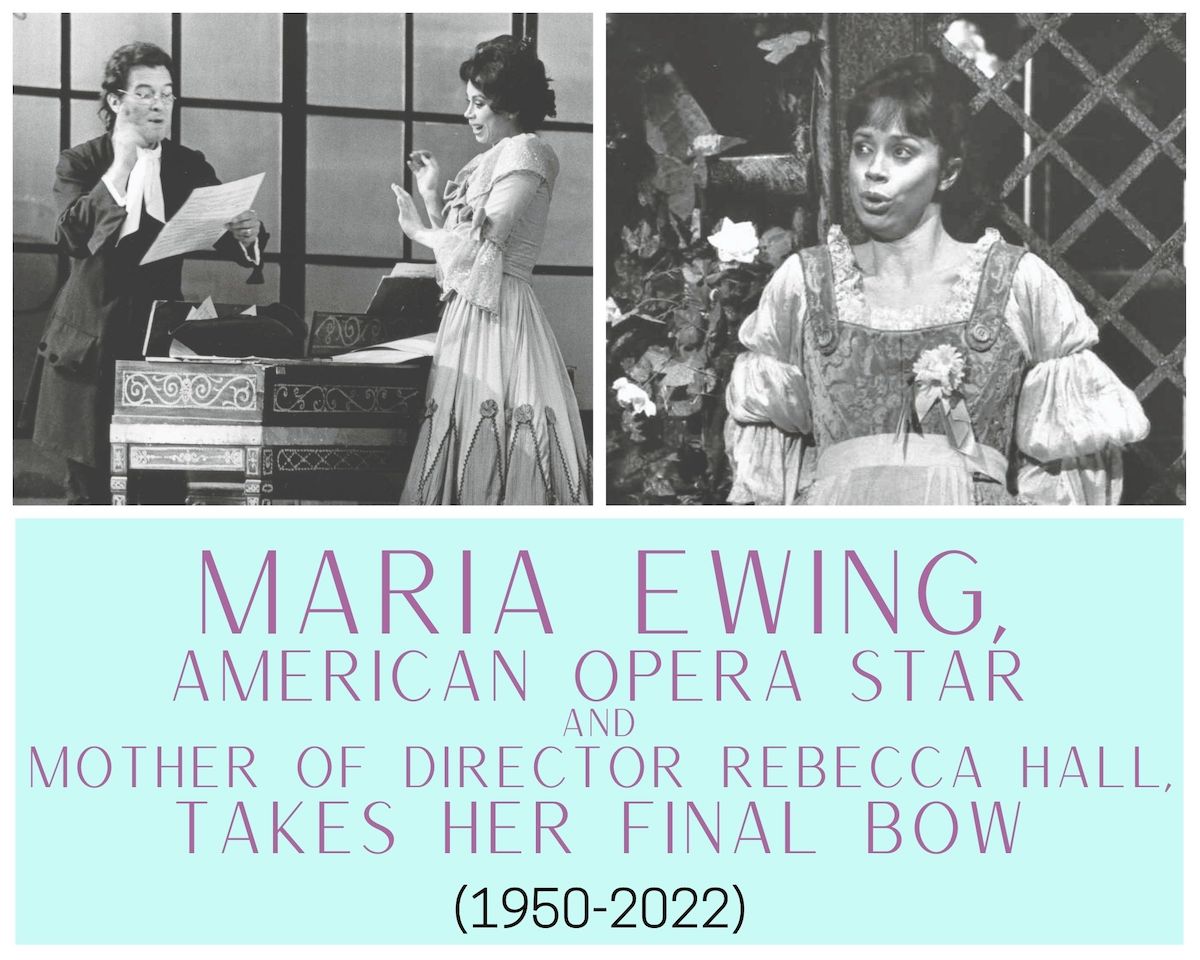She was an extraordinarily gifted artist who by the sheer force of her talent and will catapulted herself to the most rarefied heights of the international opera world.
It is with a heavy heart that I report the death of Maria Ewing, the American opera singer whose beauty, intensity of performance and soprano and mezzo-soprano voice made her an international star. Ms. Ewing is also the mother of director/actor Rebecca Hall. It was Ms. Hall’s curiosity about Ms. Ewing’s racial background that inspired Rebecca Hall’s feature directorial debut, “Passing.” We offer the most sincere condolences to Ms. Hall, as well as to Ms. Ewing’s surviving sisters: Norma Koleta, Carol Pancratz and Francis Ewing. Ms. Ewing was preceded in death by her ex-husband, British theater impresario, Sir Peter Hall.
The Ewing family issued a statement reading:
“On January 9th, 2022, Maria Louise Ewing died of a brief illness at her home outside Detroit, Michigan. She was an extraordinarily gifted artist who by the sheer force of her talent and will catapulted herself to the most rarefied heights of the international opera world… She was deeply loved, and her loss will be felt not only by her family and friends, but by all those around the world who were touched by her singular voice.”

Born in Detroit in 1950 to Hermina Maria Veraar and Norman Ewing, Ms. Ewing made her professional debut under the auspices of conductor James Levine at the 1973 Ravinia Festival in Illinois, and three years later, he cast her as Cherubino in a production of Mozart’s “The Marriage of Figaro,” at the Metropolitan Opera. This marked the beginning of her career as one of the most acclaimed soprano and mezzo-soprano opera singers in the world. Ms. Ewing would eventually sing 96 performances at the MET, and she sang at all of the major opera houses internationally. You won’t find many opera singers with the pedigree of having sang as Tosca opposite Placido Domingo and as Salome opposite Samuel Ramey.
Chicago’s Lyric Opera is very proud of her rich history with them. After making her debut in “The Marriage of Figaro,” she returned to the stage of the Lyric Opera in five subsequent roles — Rosina in “Barber of Seville”; Idamante in “Idomeneo”; Hanna Glawari in “The Merry Widow,” and the title roles in “Susannah” and “Salome” over the following decade. In some of the productions at the Lyric and elsewhere (including at the MET in Bizet’s “Carmen,” and at the LA Opera in a highly celebrated “Salome”), she was directed by her then husband, Sir Peter Hall.

Her relationship with Mr. Hall, a founder of the Royal Shakespeare Company and then director of the National Theatre, blossomed while performing Mozart’s “Cosi Fan Tutte” at Glyndebourne in 1979. Ewing married Hall on Valentine’s Day in 1982. That marriage produced, Rebecca, Ms. Ewing’s only child. Although she and Mr. Hall divorced in 1990, they remained friends until his death in 1997.
Ms. Ewing was known for her incredible ability to act on stage as well as her singing. Operatic roles are melodramatic and bigger than life, and she was not afraid to be inspired by her own emotions in interpreting her roles. “Actors talk about what their characters feel,” Ms. Ewing has said. “But it’s yourself you are talking about –your idea and your understanding of the character. Ultimately it’s you who comes across.” She famously performed a scene in the nude during Hall’s production of Strauss’ “Salome,” despite her husband’s desire for her to wear a G-string. “But I think that’s dishonest and I think it’s vulgar,” she told a BBC Radio 4 show. “Nudity isn’t vulgar in this context, any more than the nudity we see in most classical paintings.” She later said in an LA Times interview, “I do what I believe is right. If this appears to be risk taking or daring — so be it. The theater is meant to be a place where emotions are unleashed and where one reveals oneself.”

She stepped away from full-scale productions in 1997, but continued to record and give recitals. “The voice reaches a certain peak in your mid-30s and from then on is the real singing,” she told The LA Times in 1992: “That’s when the real life happens, too. As your life progresses, it affects your work. Whatever emotion you’re going through, you can use all of it. I think that’s what theatre is about.”
Ms. Ewing passed at age 71 just days following her daughter’s appearance on the PBS series, “Finding Your Roots.” The real life revelations about her family by Dr. Henry Louis Gates, Jr. were as breathtaking and melodramatic as some of her opera roles. He revealed that Maria Ewing’s father, Norman, was not part Native American, as they thought, but was listed in documents of that time as “part mulatto.” His father, John Ewing, was one of the most prominent African-Americans in Washington, and one of her forebears was estimated to be one of a small number of people of color who fought in the American Revolution (you can read some of the details here).

Rebecca feels fortunate to have been able to share a screening of her film “Passing” with Ms. Ewing. She said her mother was incredibly moved upon initially seeing the film she had made. “There were a lot of tears,” she noted. “She said that she felt her father would have been released by it on some level because he was never able to talk about it. This has given our family an ability to not feel like there’s something that’s hidden.”
Rebecca said her mother also had a chance to see her episode of “Finding Your Roots,” and appreciated that the racial truth of her family background was finally being celebrated. Brava! After such a distinguished career on stage, and in life, Ms. Ewing passed away quietly, Sunday, January 9th, outside her home in Detroit.

Header photos courtesy of Tony Romano.












